The HTC 10 Review
by Joshua Ho on September 19, 2016 8:00 AM ESTLatency with Google WALT
One of the major points of differentiation with the HTC 10 is supposed to be smoothness. This, more than anything was something that HTC emphasized repeatedly in their initial introduction of the HTC 10. This phone is supposed to be smooth in a way that most of the Android competition isn’t. It’s really kind of disappointing to me that there isn’t a lot of information in the public domain testing HTC’s claims.
So in the interest of testing this out, I managed to get a WALT device working. What's WALT, you may ask? It's an internally developed Google toolset and hardware device combination to measure touch latency on Android (and Chromebook) products. By combining some simple external sensors connected to a Teensy board with the appropriate software to measure those sensors, WALT makes it possible to directly measure several forms of touch and audio latency of an Android device. Normally this would require a high-speed camera, but Google has developed WALT as a more practical alternative, internally validatating the product against said high speed footage.
To start we can look at tap latency and screen response time. Combining these two figures together will give us the total time it takes at minimum for the device to respond to a tap. It’s worth noting here that there is an upper bound to screen response time because devices are generally locked to 60 Hz and triple buffering means that our response time at best can be 48 ms. The screen response time figure is dominated by this latency in almost all cases, with some extra overhead for the panel’s native response time and some OS overhead can be involved as well.
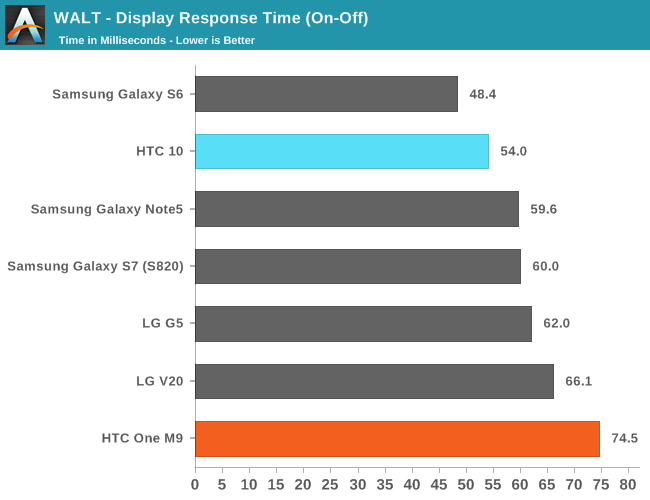
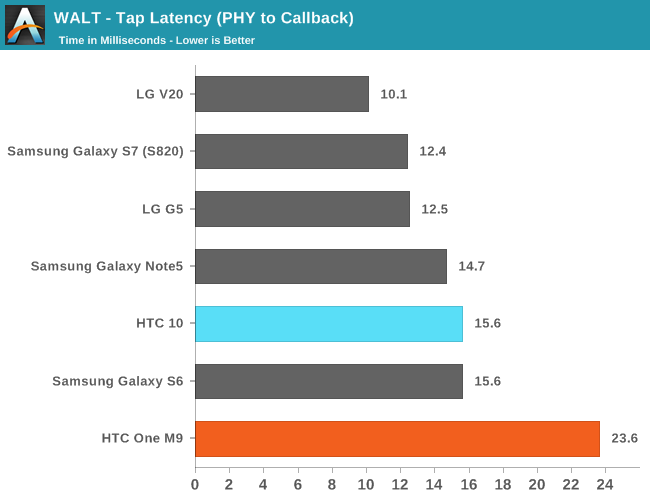
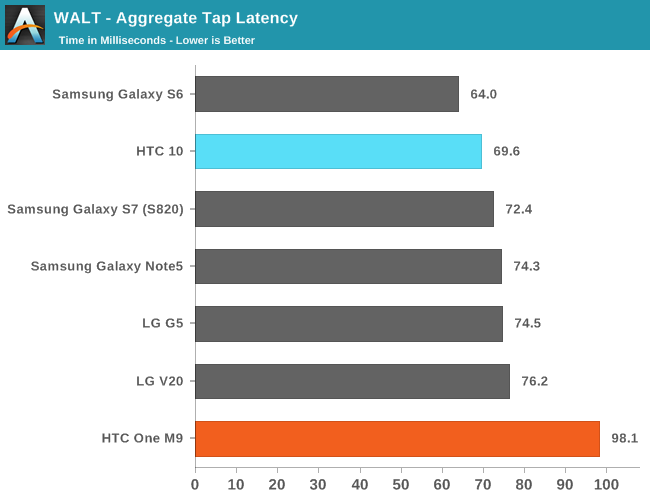
In tap latency the HTC 10 performs fairly well but everything is so close here that I'm not sure it really matters. In the interest of trying to see what exactly HTC was trying to highlight I also went ahead and used the drag latency test to try and see if this was a notable point of differentiation.
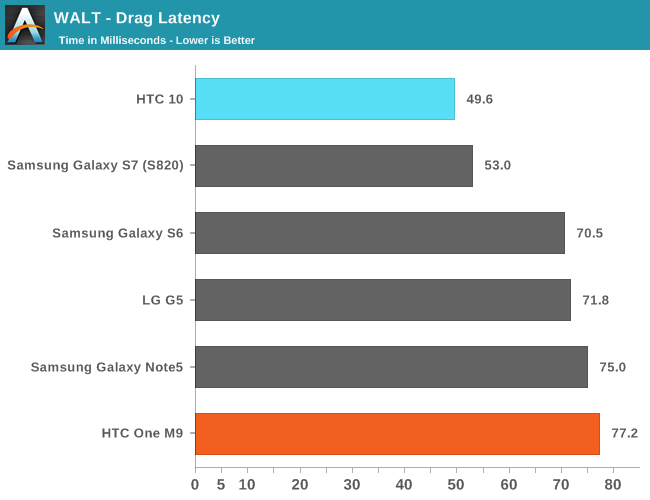
While I would say that WALT's drag latency test seems to be highly unreliable and I'm kind of questionable on whether these results can really be trusted, there's definitely a noticeable difference in how quickly the HTC 10 responds to a swipe compared to most of the competition. The Galaxy S7 seems to keep up which is kind of surprising. I suspect that most of the difference in response between the two devices is the momentum given to a swipe rather than the actual latency.
Misc
With every review there are a lot of little things here and there that I end up discovering along the way that are interesting and worth discussing, but often cannot be discussed in a section of its own, but there are definitely things that have managed to grow past this section into their own as noteworthy.
One of the first places to start is the GNSS of this phone. I’m not sure what exactly HTC did here, but it’s remarkably fast and high quality. When connected to a network A-GPS through the cellular modem (Qualcomm gpsOne) allows for near-instant locks, but I managed to achieve a true cold lock in 1 minute and 6 seconds and it reached a precision of 13 feet within 10 seconds after initial position fix. Precision seems to be as high as 10 feet, which is pretty much the lower bound of what GPS can do without differential GPS systems which allow for precision down to about 10 centimeters.
In addition to GPS reception for whatever reason the HTC 10 seems to have noticeably good reception on AT&T LTE in the SF Bay Area and Los Angeles. It was not unusual for me to see the One M7 sitting on HSPA+ while the HTC 10 would still be on LTE. Of course, I don’t have any formal testing to back this claim up but generally speaking I saw anywhere from 3 to 6 dBm of difference in received power in favor of the HTC 10.
As far as design wins go, ST-M takes the design win for the laser auto-focus sensor, Synaptics is used for the touchscreen, Cypress CapSense Cy8C PSoC is used for the capacitive buttons, an NXP TFA9888 amp is used for the speakers, NXP PN544 is used for NFC, and an Analogix chip is used to enable the USB-C port. It’s identified only by the codename Ohio, but it’s fairly likely that this is the ANX7418. There’s also an ANX7816 for 4K30 over SlimPort. Looking at the SPI bus, for some reason there’s a Micrel KS8851 Ethernet MAC controller and HTC’s custom MCU which is referred to as CwMcuSensor. There’s also an Fingerprints FPC1155 for the fingerprint scanner, and an AK8789 hall sensor.
HTC claims that audio is over a separate DAC and amp, but I really can’t find any evidence that the HTC 10 has a DAC outside of the Snapdragon 820 in the system files, namely the WCD9335. Regardless, the speakers on the HTC 10 are a lot better than most other Android phones on the market. They’re still a step down from the One M9 or M8, but they do provide a fairly convincing stereo effect if you turn it on and overall quality is acceptable. I’m not exactly an audiophile but music over the 3.5mm jack didn’t have any noticeable issues like hissing or popping or anything strange like that.


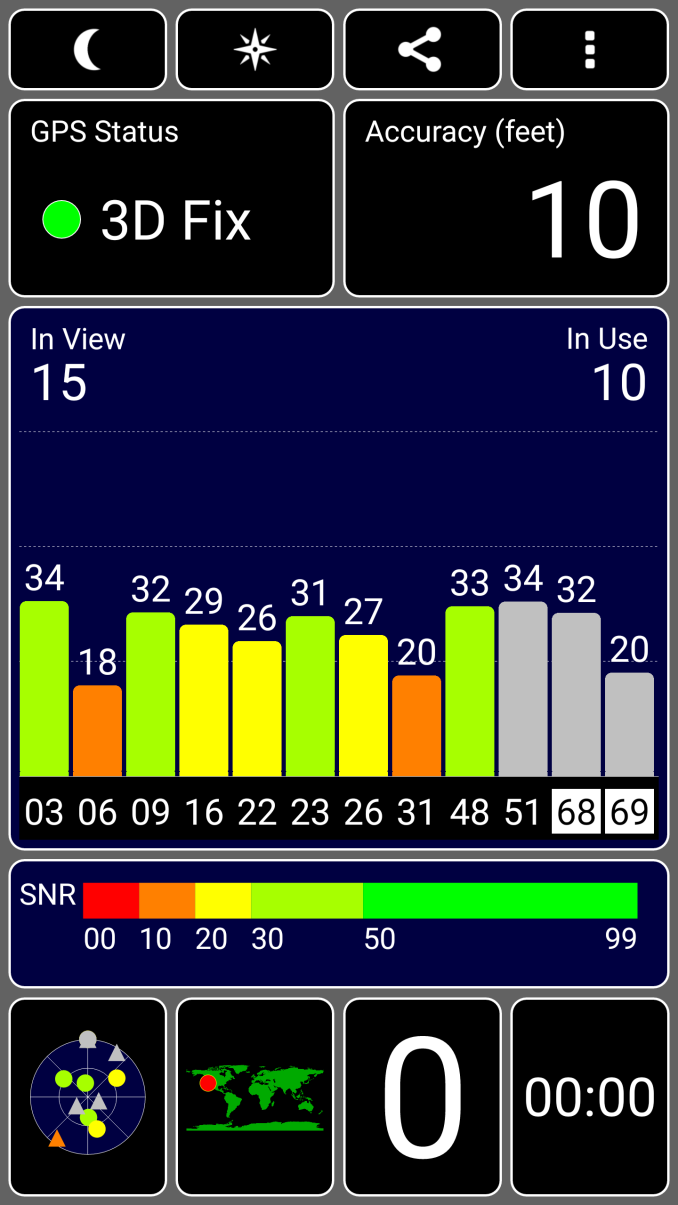








183 Comments
View All Comments
TheMysteryMan11 - Monday, September 19, 2016 - link
Hate to be that person, but HTC 10 is dead. People have forgotten about that phone and moved on. Sales have tanked and nobody really gives a damn about this phone at this point.TheMysteryMan11 - Monday, September 19, 2016 - link
And yes, I know I am generalising here.close - Monday, September 19, 2016 - link
So what you mean is you don't care about this review. Cool. I think everyone got it from this first comment.Now it makes me wonder why you feel the need to defend your opinion about your personal preferences with so many comments... I'm starting to think it's because you're very insecure saying this and need to convince yourself you're right. Just be honest for a second: you actually think HTC is alive an well, that people still think about it and care about it but you are fighting this feeling and you're hoping that by repeating your "skeptic comment" you'll convince yourself.
This is the only explanation for a guy trying to convince others that he know better what they want.
And yes, I know I am generalizing here.
theduckofdeath - Monday, September 19, 2016 - link
I think it's more a complaint against this site. This review would have been relevant six months ago. Still, more relevant than this site is turning into, though. :DI really liked coming here before. I don't see much point with it any more. I mean, what the eff? The next gen HTC flagship is right around the corner, few stores have this model left in the booths and NOW Anandtech posts a review of it?
ACM.1899 - Monday, September 19, 2016 - link
i think it's not that late (compared to Apple lifecycle of 3 years); some places(countries) may have just received the phone or waited for it to become cheaper or...(assuming 5 months is a long time) : he could've analyzed the sharp panel as well as the its polarization or other issues that appear after a while (some in Xda-Forums) ; or testing or introducing a custom rom that of course is manageable through Xda.
nevertheless it was a great and in depth review, as always.
ArmedandDangerous - Thursday, September 22, 2016 - link
Here in Malaysia, the HTC10 JUST became available, and looking forward to getting one!berantle - Saturday, September 24, 2016 - link
HTC 10 was available in Malaysia since end July 2016. My unit was delivered in the 1st week of August. It's the official local unit and not a grey-market import.Prod1702 - Tuesday, September 20, 2016 - link
I 100% agree. I am not sure if having the review out months ago would of made the HTC 10 sell more but having it come out this late in the game doesn't help at all.RadiclDreamer - Tuesday, September 20, 2016 - link
Yeah, Im going to agree with MysteryMan11 here, this phone is so old even my grandma wouldnt be caught dead using it.eclectech - Wednesday, September 21, 2016 - link
I read this review on my HTC 10. Today, it's still a great phone. A great phone is a great phone, even when new phones come out.